
by Gideon Marcus
Mazel tov!
This article is going to be short on news as the Marcus family has been occupied this past week. The Journey has had its first inter-staff wedding! The Young Traveler and Trek Correspondent Elijah broke the glass under the chupah on the 19th. Sadly, the pictures aren't back from the Fotomat, so in lieu of that, here is a shot from my nephew David's wedding to Ada Argov in Israel from 1962.
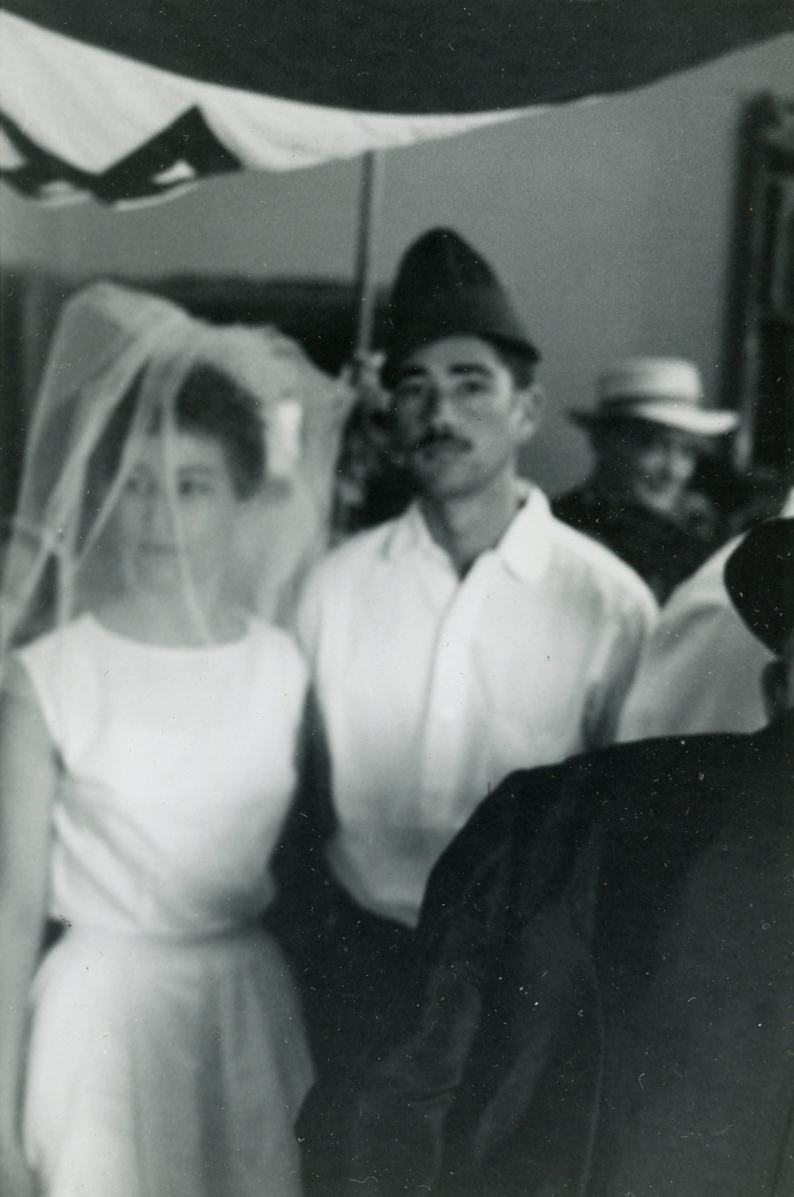
The issue at hand
Between last-minute dress alterations and sifting through RSVPs, I managed to snatch time to read the stories of this month's Magazine of Fantasy and Science Fiction. Unlike the marriage of Lorelei and Elijah, it is not a flawless affair, but it is also not without its charms. Let's take a look:
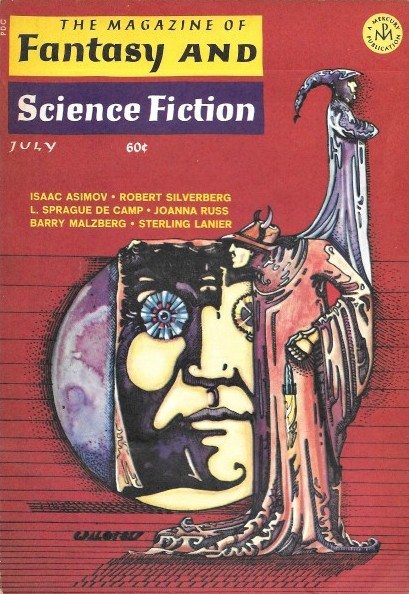
by Ronald Walotsky
His Coat So Gay, by Sterling E. Lanier
First up is one of the riveting tales of Brigadier Ffellowes, back from when he was just a young subaltern stationed near Washington. Invited to a fox hunt by an ancient, well-heeled family, the Britisher soon learns that his Irish hosts have something more mean-spirited planned for him than a simple beast chase.
As usual, Lanier deftly mixes legend with pulp sensibility for a riproaring, engaging read.
Four stars.
Clean-up, by Doris Pitkin Buck
A short poem about either the morning metaphorically cleaning up Buck's front stoop, or a fellow named Morning doing same.
Sometimes I like Buck, but this one left me cold. Two stars.
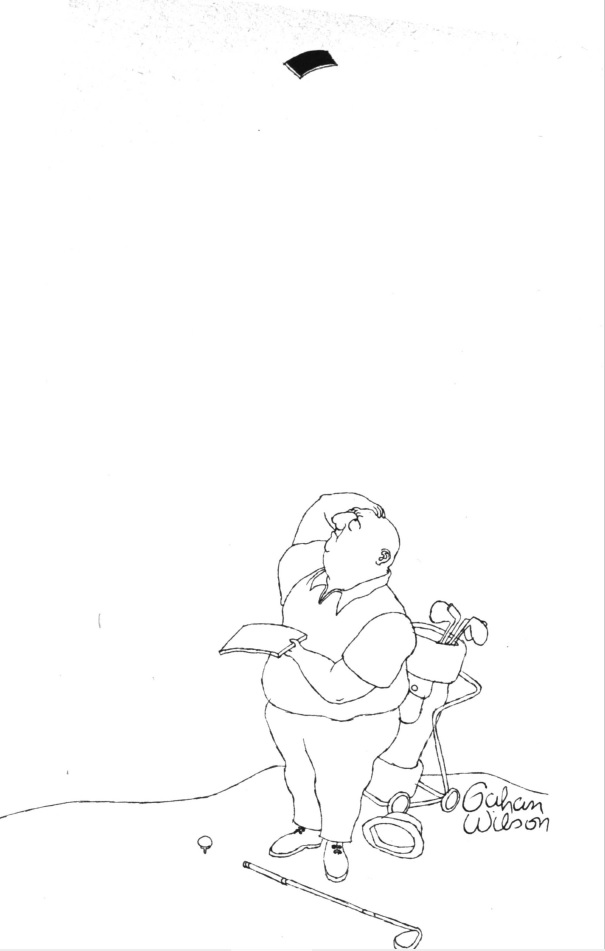
by Gahan Wilson
Making Titan, by Barry N. Malzberg
A beefcake test-pilot captain, an astrologer, and a demonologist head for Saturn's biggest moon. No, this isn't the setup to a joke, but the make-up of the crew of the eighth attempt to make landfall on Titan. All of the previous, scientific attempts mysteriously failed, so NASA has figured, what the hell, let's send pseudoscientists instead.
This might have worked as a joke premise. In this story, it is played deadly serious. Moreover, nothing actually happens, which is deeply dissatisfying. No devils are summoned. No charts are followed. And the results of the eighth failure are never described. All we get is a dozen pages of anger-infused angst.
Two stars.
Books (F&SF, July 1970), by Joanna Russ

Budrys covered it in Galaxy, and now Russ is reviewing Anne McCaffrey's fix-up of her The Ship Who… stories. Interestingly, Russ prefers the later ones to the earlier ones (I feel the opposite, though to be fair, I have not read the final installation, which was never magazine-published).
Russ feels that Poul Anderson phoned in Satan's World, the latest David Falkayn story, and she is dismayed at the sheer degree of downbeat bummer that characterizes it. "I think Poul Anderson sees the world as an unhappy place of much vulnerabilitv and little splendor and that he ought to say so. One of the striking things about WORLD (and this is usual lately with this author) is that the book's evocations of joy, strength, and freedom fall very flat indeed."
And, echoing the rest of us, Russ says, "It is rude to make nasty noises about half-loaves to someone who must, after all, make a living from the stuff, but I would like to take this opportunity to register a personal hwyl on the subject of what Anderson the formalist has done to Anderson the artist. The novels he could write! The novels he won't write! If this goes on much longer, I shall burn my copy of THREE HEARTS AND THREE LIONS and expire amid the ashes. And it would not be so bad if the man were not—intermittently—so very, very good."
As for Aldiss' "experimental" Report on Probability A, donated free of charge to New Worlds, but probably sold for cash to Doubleday, Russ says: "I admire everything about the novel except its length. Matter organized in the lyrical, not the narrative, mode cannot be sustained
for this long. REPORT would have made a brilliant novelette, but as a novel it is sheer self-indulgence. I had to work very hard to get through it at all and would on no account read it again."
Finally, Russ accurately catalogs Ray Bradbury's flaws, but then gushes over his latest collection, I Sing the Body Electric anyhow. I think you'll find George's review of the book a bit more nuanced and, perhaps, accurate.
Starlight Shining Through Her Eyes, by Neil Shapiro
Mawkish, lumpy, juvenile piece about a boy who makes telepathic contact with a stranded alien girl on the Moon. The boy becomes an astronaut to follow in Armstrong's footsteps a decade later and deserts his companions to be with his space lady. Told from the perspective of the boy's childhood friend.
Two stars.
The Quarter-Acre Round Table, by L. Sprague de Camp
Pretty neat piece summarizing all we know about the historical pinnings of the King Arthur legend. Apparently, it's not much. Also, Sir Richard Mallory was a bastard (figuratively, not literally…I think.)
Four stars.
Ishmael in Love, by Robert Silverberg
Normally, the notion of Silverbob writing romance gives me pause. However, all of Bob's tics work in his favor in this, the tale of a dolphin in love. For "Ishmael" the cetacean feels truly alien and truly plausible as he pines for the scientist "Lisabeth", with whom he works at his undersea desalination plant.
Easily the best piece in the issue. Five stars.
Tom Cat, by Gary Jennings
A pampered Jet Setter, dismayed at the news that his myopic aunt plans to award her six billion dollar fortune to her cat, disposes of the pet, clads himself in furs and takes to meowing to claim the inheritance. He is unsuccessful at his gambit, but he ultimately finds happiness anyway.
I tend not to like these frivolous tales, but it's cute enough and short enough to be inoffensive.
Three stars.
The Mystery of His Flesh, by Dean R. Koontz
The first android is on the run, aided by his doctor friend. The artificial man is being hunted because he dares to do the inexcusable: bring humans back from death on a planet crowded with nine billion souls.
The pair flee to the wastes of Alaska, the World Authority hot on their tail. In the snowy tundra, the two contend with wolves as the android slowly, inexorably evolves toward a new form. Before the doctor's horrified eyes, the synthetic human grows new flesh, changing from a familiar shape to a pulsing, tentacled thing—a factory to produce more of its kind.
Whether the android's aim be benevolent, as it claims, or otherwise…we never find out.
Koontz does a great job rendering scenery and building tension, but the lack of a real conclusion, the silliness of the premise (somehow, the android will not only make humans immortal, but can even allow us to teleport), and the repetitious nature of the narrative keeps the story unmemorable.
Three stars.
My Planet 'Tis of Thee –, by Isaac Asimov

The Good Doctor makes a plea for humanity to take the money it spends on wars and, instead, apply it to expansion into space. Otherwise, we are doomed as a race to overpopulation, scarcity, and endless strife.
Nice sentiment, but a bit hollow and short on the science I'd prefer to get from this column.
Three stars.
The State of the Art, by Robin Scott Wilson
Barney Chekaris is a scientist when it comes to love, and that's his problem. On paper, he has all the specifications of the perfect catch—interesting, handy, athletic, handsome. But when he plays the wooing game, he's all superficialities, afraid to be vulnerable. Failing to recognize this failing, he undertakes an intensive effort to distill what compels attraction between the sexes.
He tries scientifically analyzed poetry, sex texts, foods, sartorial choices…all of them get him laid, but none of them get him love. Finally, he tries meticulously arranged, hypersonic music as a catalyst for a relationship.
The moral of the story, if phrased as a Rocky and Bullwinkle episode title would possibly be: "Be Yourself" or "Spasibo placebo!"
This should be an awful tale, another of many Playboy rejects that finds a home in F&SF after rejection from the high-rent venues—but it's actually really sweet.
Four stars.
Doing the math
This really is a mixed bag of an issue, with a lot of filler and several clunkers. The superlative stuff brings the average above three stars, however, belying the notion that summer-dated mags end up with the dross. Indeed, we seem to be on a four-month roll after the discouraging late winter we endured earlier this year.
So enjoy this issue, with my guidance, and when you're done, go gaga over the art prints advertised at the end of the ish.
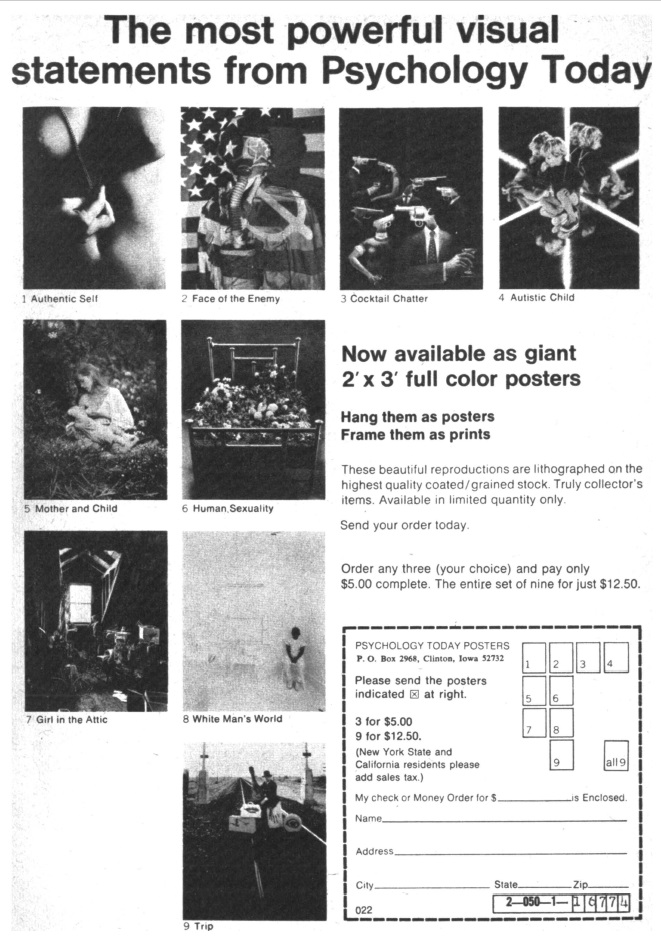
Or don't…
[New to the Journey? Read this for a brief introduction!]

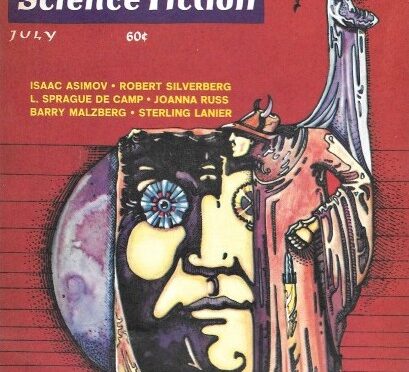


Congratulations to the happy couple, but perhaps the joy of gaining a son has left you a little too ebullient. I'd knock a star off of all those fours and fives, though I agree with your lesser ratings.
No, I take that back. I probably would give brigadier Ffellowes that fourth star. None of these stories has quite been up to "Soldier Key," but this is definitely one of the best since then.
The Malzberg, on the other hand, yeesh. I might even have accepted the set-up for a serious story; F&SF does run fantasy, after all. But there's no pay-off for all that angst. It's not in service of anything.
"Starlight" was silly, though again it better fits the fantasy side of this publication. The concept was horribly dated and given just enough polish to make it fit current events.
Nice article by de Camp, though there may be a little more to Arthur than he allows. Read Mary Stewart's author's notes at the end of her recent book about Merlin.
Silverbob's latest is good, definitely the best story in the issue. It's even close to the best he's shown himself capable of (for my money, "To See the Invisible Man" is still the best thing he's ever written, but it's been several years now). I'm just not sure it's worth that last star. Maybe it's just that I kept expecting something awful and that spoiled my full enjoyment of the story.
"Tom Cat" was a nothing. Passable filler, nothing more.
The Koontz story definitely doesn't want you thinking about it too hard. But most of the action is done fairly well. Dean's capable of better, but this is a respectable average for him to rise above and hopefully not sink too far below.
Dr. A's article was sadly lacking in science.
"State of the Art" was fine, certainly nothing objectionable, and it's quite readable. Still, I just don't see a fourth star there. "Sweet" isn't enough for me. I need more substance.
All reasonable quibbles. Romance done well appeals to my incurably romantic heart.
Oh, I love this Malzberg…. That is all.
I know this is "in the future" but it works very well as a fix-up portion of Universe Day (1971), Malzberg's absurdist black comedy take on "future history."
Thanks for reading! What did you enjoy about the Malzberg?
Everything. He pokes holes in our fetish for conquest (as manifested by the relentless voyage outward to new places for dubious purpose) by deploying alternate knowledge systems that, again, in themselves, also utterly fail (as did modern science). As long as this mechanized future achieves the goal, anything goes… It's as bleak as you can get. And downright hilarious. Summoning a demon would defeat the entire point.